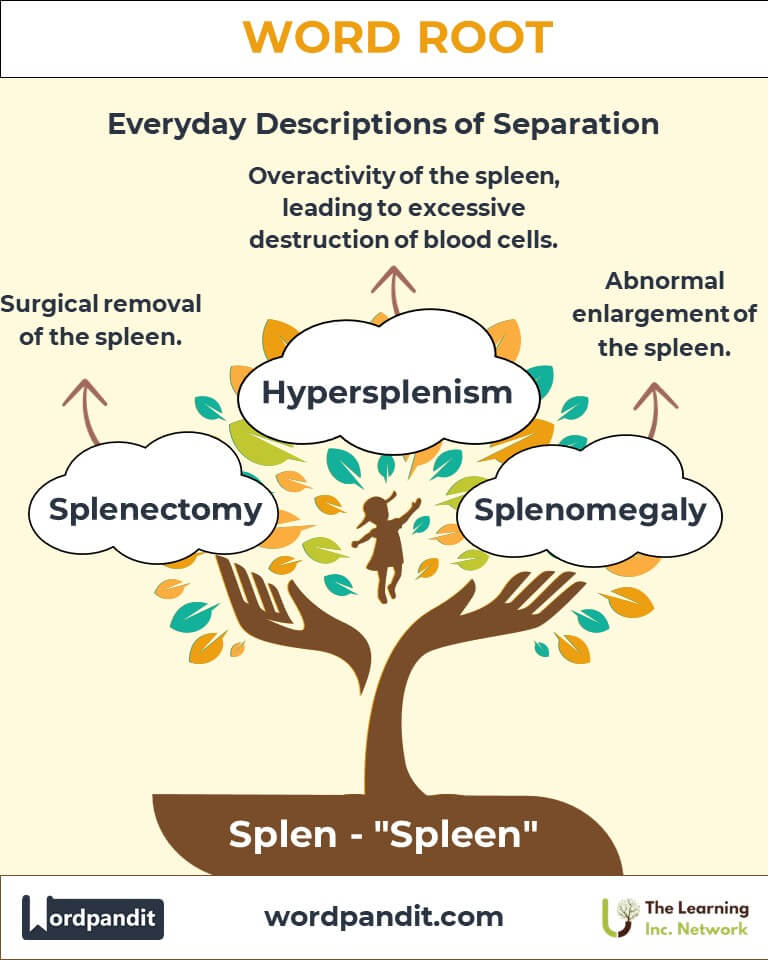Splen: The Root of Vitality and Emotion in Language and Medicine
Byline: Explore the linguistic and functional richness of the root "Splen," derived from the Greek word for "spleen." From its association with emotions like anger to its pivotal role in medical terminology, "Splen" highlights the interplay between body and language.

Table of Contents
- Introduction: The Essence of Splen
- Etymology and Historical Journey
- Mnemonic: Unlocking the Power of Splen
- Common Splen-Related Terms
- Splen Through Time
- Splen in Specialized Fields
- Illustrative Story: Splen in Action
- Cultural Significance of the Splen Root
- The Splen Family Tree
- FAQs about the Splen Word Root
- Test Your Knowledge: Splen Mastery Quiz
- Conclusion: The Living Legacy of Splen
Introduction: The Essence of Splen
The root Splen (pronounced "splen") derives from the Greek word for "spleen," a vital organ often linked historically to emotions, particularly anger and melancholy. While the spleen plays an essential role in filtering blood and supporting immunity, its metaphorical significance in language reveals much about how ancient cultures understood emotion and health.

Etymology and Historical Journey
The root Splen originates from the Greek "splēn," which referred both to the organ and the temperament it was believed to influence. Ancient physicians, particularly those in the Hippocratic tradition, associated the spleen with mood regulation, giving rise to terms like "splenetic," meaning bad-tempered or irritable. Over centuries, the term retained its medical significance, even as its metaphorical usage evolved.
Mnemonic: Unlocking the Power of Splen
To remember Splen, visualize a spleen-shaped stress ball symbolizing anger and irritation. Squeeze it to recall its dual meaning in medicine and emotion.
Mnemonic Device: "Splen: The spleen shapes mood—think stress and immunity too!"
Common Splen-Related Terms
- Splenetic (spluh-NET-ik):
- Definition: Irritable or bad-tempered.
- Example: "His splenetic remarks soured the conversation."
- Splenomegaly (splen-oh-MEG-uh-lee):
- Definition: An abnormal enlargement of the spleen.
- Example: "The patient’s fever and fatigue led to a diagnosis of splenomegaly."
- Splenectomy (spluh-NEK-tuh-mee):
- Definition: Surgical removal of the spleen.
- Example: "Splenectomy is often necessary in cases of severe spleen injury."
- Splenic (SPLEN-ik):
- Definition: Pertaining to the spleen.
- Example: "Splenic tissue plays a crucial role in immune function."
- Hypersplenism (hye-per-SPLEN-izm):
- Definition: Overactivity of the spleen, leading to excessive destruction of blood cells.
- Example: "Hypersplenism often requires careful management to prevent anemia."
Splen Through Time
- Classical Era: The spleen was thought to influence emotions like melancholy and rage. Words like "splenetic" reflected this belief.
- Modern Medicine: Today, terms like "splenomegaly" and "splenectomy" underscore the spleen’s clinical importance, highlighting its role in hematology and immune health.
Splen in Specialized Fields
- Medicine:
- Splenectomy: A critical surgical intervention in trauma cases.
- Splenomegaly: Diagnosed in conditions like mononucleosis and leukemia.
- Literature and Emotion:
- Splenetic: Used metaphorically to describe irritable characters in novels or historical narratives.
- Immunology:
- Splenic Function: Explored in research on immunity, particularly in conditions like hypersplenism.
Illustrative Story: Splen in Action
Dr. Sarah Reynolds, an immunologist, was investigating a rare case of hypersplenism in a young patient. The child’s excessive fatigue and frequent infections pointed to the spleen’s overactivity. Through innovative splenic tissue analysis, Dr. Reynolds identified a genetic anomaly and developed a targeted treatment. Her breakthrough not only restored the child’s health but also expanded the understanding of spleen-related disorders.
Cultural Significance of the Splen Root
In ancient and medieval thought, the spleen was central to humorism, a system linking bodily organs to personality traits. While modern science has debunked these ideas, the root Splen persists in language, reminding us of how the body and emotions were once seen as interconnected.

The Splen Family Tree
- Hepat- (Liver): Terms like hepatology (study of the liver).
- Cardi- (Heart): Words like cardiology (study of the heart).
- Gastr- (Stomach): As in gastronomy (study of food and culture).
FAQs About the "Splen" Root
Q: What does "Splen" mean?
A: "Splen" refers to the spleen, an organ involved in blood filtration and immunity. It originates from the Greek word "splēn."
Q: What is Splenomegaly?
A: Splenomegaly is the abnormal enlargement of the spleen, often caused by infections, diseases, or immune conditions.
Q: Is Splen still linked to emotions?
A: Historically, yes; the spleen was thought to influence emotions like anger or melancholy. Today, it is understood primarily in a medical context.
Q: What does Splenectomy involve?
A: Splenectomy involves the surgical removal of the spleen, often performed in cases of severe injury, certain diseases, or immune system conditions.
Q: What does Splenetic mean today?
A: Splenetic figuratively means irritable or bad-tempered, reflecting ancient beliefs about the spleen's influence on temperament.
Q: Why is the spleen important?
A: The spleen filters blood, recycles iron, and supports immunity by helping to fight infections.
Test Your Knowledge: Splen Mastery Quiz
1. What does "Splen" mean?
2. What does "Splenomegaly" describe?
3. What does "Splenectomy" involve?
4. What does "Splenetic" mean figuratively?
5. What condition involves excessive spleen activity?
Conclusion: The Living Legacy of Splen
The root Splen bridges ancient ideas of emotional temperament with modern medical science. As both a linguistic artifact and a clinical term, it underscores the enduring relationship between language, body, and culture. Whether in describing a surgical procedure or a metaphorical outburst, Splen continues to enrich our understanding of human health and expression.












